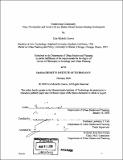Constructing Community : class, privatization and social life in a Boston mixed income housing development
Author(s)
Graves, Erin Michelle
DownloadFull printable version (21.33Mb)
Alternative title
Class, privatization and social life in a Boston mixed income housing development
Other Contributors
Massachusetts Institute of Technology. Dept. of Urban Studies and Planning.
Advisor
Lawrence J. Vale.
Terms of use
Metadata
Show full item recordAbstract
Social interaction among friends and neighbors is generally considered an informal process. Consequently, we often think of the structure of personal social networks as an expression of people's individual preferences. The observed homogeneity within social networks is often treated as a near socio-biological fact: people, like "birds of a feather," flock together. This dissertation examines unexpected influences on cross-class interaction in a privatized mixed income housing development in Boston, Massachusetts. The research site Maverick Landing was constructed as an alternative to low-income public housing as part of the HOPE VI program funded by the U.S. Department of Housing and Urban Development. Through research methods including fourteen months of residency and participant observation at Maverick Landing, semi-structured interviews and document analysis, this study shows how formal processes interacted with informal ones at the interpersonal level and impacted cross-class interaction. Management enforced a formal structure -- including rules and control of physical space, as well as more subtle measures such as information control and resource distribution - that substantially negatively influenced interpersonal relations. Larger structural realities too shaped the actions of the management company. Relative to their lower income neighbors, higher income residents had considerable leverage in the housing market, making them much harder to recruit and retain. Due to this structural disparity, management sought to satisfy the market rate residents over the subsidized ones, resulting in cross-class resentment. Additionally, the social structure evident at Maverick Landing was in part the outcome of a chain of processes that began at the Federal level where the potential for privatization and income mixing was promoted through policy. (cont.) Following the "implementation chain" from the federal level, to the local level, to the site of implementation, Maverick Landing and finally to residents' actions and reactions, this research shows how social interaction is structured by public and private actors outside of the implementation site, Maverick Landing. Privatized mixed income developments, many hoped, would reduce inequality between lower and higher income people. But in important ways, the intervention reproduced inequality. And it shows us how class is protected, not just by its members but also by institutions.
Description
Thesis (Ph. D.)--Massachusetts Institute of Technology, Dept. of Urban Studies and Planning, 2008. Includes bibliographical references (p. 268-277).
Date issued
2008Department
Massachusetts Institute of Technology. Department of Urban Studies and PlanningPublisher
Massachusetts Institute of Technology
Keywords
Urban Studies and Planning.